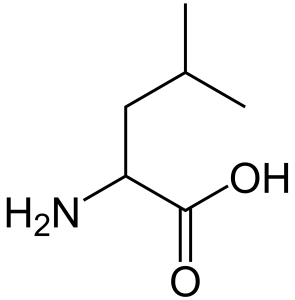Essential amino acid leucine may improve muscle growth post-workout, but the need for supplementation remains controversial.

- Promoting muscle growth. Leucine slows down muscle protein breakdown and promotes muscle protein synthesis after high-intensity exercise.
Overview
Leucine is a proteinogenic (used by the body to produce proteins) amino acid best known for its role in muscle protein synthesis. It is categorized as a branched chain amino acid (BCAA) alongside isoleucine and valine, all of which cannot be made in the body and must come from dietary sources. BCAAs are crucial for building muscle mass, which explains why bodybuilders have high protein intake. Protein-rich foods such as meat, chicken, fish, nuts, and milk are all great sources of leucine.
In addition, leucine has the unique property of being the only amino acid known to directly stimulate the process of muscle protein synthesis, which results in muscle growth. As such, fitness enthusiasts have long considered the value of leucine in either pre-workout or post workout supplementation, particularly in the context of weight-training.

How Leucine Might Help Post Workout Formulas
Promoting muscle growth
Muscle mass is governed by the relationship between muscle protein breakdown (MPB) and muscle protein synthesis (MPS); if the rate of MPS is higher, then muscle will be gained, and vice-versa. Resistance training and other forms of strenuous physical activity increasing MPB, but can also significantly boost MPS IF amino acid intake is sufficient. This is where leucine and other essential amino acids come in – by providing the building blocks for repairing muscle after exercise, they allow the rate of MPS to outstrip MPB and lead to muscle growth.
In addition, as mentioned above, leucine is also unique in that it directly stimulates MPS by enhancing activation of the mammalian target of rapamycin (mTOR) signaling pathway that promotes muscle hypertrophy.1 2 Finally, leucine might also be capable of simultaneously reducing the rate of MPB, but more research into this are is needed. 3
Leucine’s Post Workout Benefits & Uses
The main proposed benefit of supplementing leucine post-workout is improved muscle recovery & growth. Having said that, the need to supplement leucine by itself remains controversial because it is already present in protein-rich foods and protein supplements. In fact, current research suggests that as long as you consume enough protein after resistance training, taking additional leucine will not have any additional benefit. 4
However, isolated leucine does still have several niche benefits. Most importantly, it can be used to:
- Improve muscle protein synthesis in the elderly, who have a blunted response to essential amino acid consumption
- Maintain a fasted state when working out, which has become a popular way to burn more fat while exercising
Research
Animal Research
Research has demonstrated that leucine is able to:
Human Research
Clinical studies confirm that leucine is effective at improving muscle protein synthesis and subsequent muscle hypertrophy. However, it’s important to stress that leucine can be obtained from dietary protein, which means that these studies would likely have similar results if the participants were given protein-rich meals or supplements instead.
In this investigation, 14 young adults were given leucine at either 1.8 grams or 3.5 grams. 180 minutes after ingestion, muscle biopsies found that net muscle protein balance and skeletal muscle protein synthesis similarly improved at both leucine concentrations, although muscle protein breakdown only decreased in the higher leucine concentration.
- The study concluded that “the leucine content typical of high quality proteins (~1.8 g) is sufficient to induce a maximal skeletal muscle protein anabolic response.”7
This study examined the effects of leucine in young versus older adults. Two young and two elderly groups were given 6.7 g of essential amino acids (EAAs) with either 26% leucine or 41 % leucine, and had their muscle protein synthesis rates examined. While both young groups saw a significant increase in muscle protein synthesis, the elderly group only had an increase at the 41% leucine dose.
- The researchers concluded that “increasing the proportion of leucine in a mixture of EAA can reverse an attenuated response of muscle protein synthesis in elderly…” 8
Leucine (0.21 g/kg) may improve lean tissue mass and physical performance
In this double-blind, placebo controlled investigation, 25 seniors took essential amino acid capsules containing 0%, 20%, or 40% leucine two times a day at 0.21 grams per kg of body weight for a 12-week period. Lean tissue mass (LTM) and functional performance (FP) were tested through arm curls, chair stands, and walk tests. Significant improvements were reported in lean tissue mass and test performance in seniors who took leucine.
- The study concluded that “twice-daily supplementation of EAAs containing 20% or 40% L-Leucine improved aspects of functional status and at the higher level improved LTM.”9
Leucine (3.5 g) plus 10 g protein seems to be more effective than protein alone for MPS
In this randomized investigation, 8 adults took a 10 gram protein drink with or without 3.5 g leucine after completing 2 individual cycling workouts. The leucine enriched protein drink was found to increase muscle protein synthesis (MPS) by 33% more than protein alone.
- The study concluded that “increasing the concentration of leucine in an EAA supplement consumed during steady state exercise elicits a greater MPS response during recovery.”10
Dosage for Post Workout
- Most research studies use 3.5 g of leucine
- Typical leucine supplements come as 5 grams of powder or a ready-to-drink shake
- Leucine is also present in all protein and BCAA supplements
Supplements in Review Says
- Leucine 3.5 – 5 g post-workout.
We recommend leucine post-workout for fasted training or older adults. Until more research is done, it seems that sufficient leucine can be obtained from food or protein supplements, which means that taking additional isolated leucine has no added benefit for muscle growth. However, the elderly and those who work out fasted can see some benefit from incorporating leucine as a post-workout supplement.
Supplements and research data suggest a dose of 3.5 – 5 g. Most supplements recommend taking 5 g of leucine, which should be more than enough as most studies use 3.5 g doses.
Leave a Reply